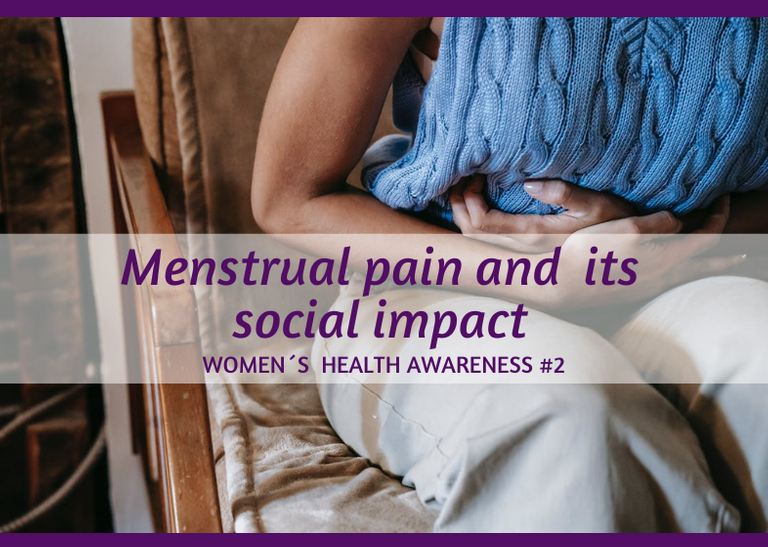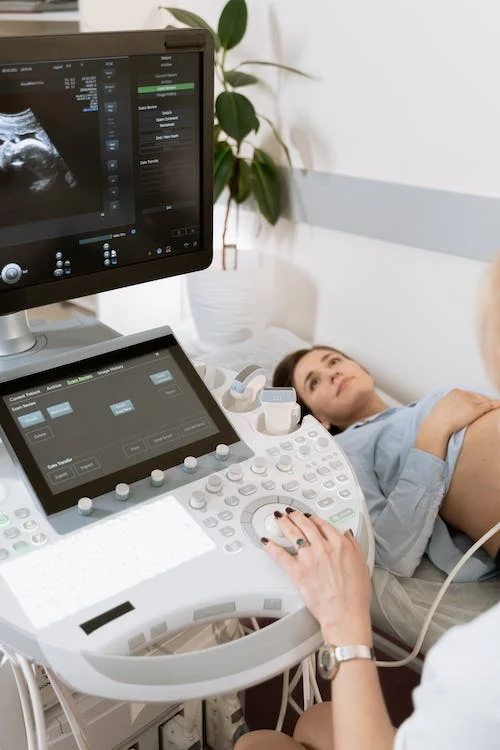There are varied experiences with menstruation. Some women do not have any symptoms except the typical bleeding of those days. However, other women know that they are close to the days of menstruation and become anxious because they know they will be hard days with many symptoms where the pain seems uncontrollable. I invite you to continue reading this post, where I will address the social implications of menstrual pain with an emphasis on the work area of women.


Talking about menstruation is a recent development. Until a few decades ago, it was a taboo subject. It is a somewhat absurd position since women of reproductive age (15-49 years) (1) have been experiencing this physiological process month by month for as long as the world has existed.
Educational campaigns on women's health have made it possible to make visible to society the silent and sometimes misunderstood struggle of women suffering from menstrual cramps. Today, thanks to this visibility, we have been able to see that there is an important percentage of the female population who suffer from dysmenorrhea (the medical term for menstrual pain), creating awareness of the importance of seeing a gynecologist and other health specialists (endocrinologists, psychologists) to be able to cope with this symptom. Sometimes the cause of menstrual pain is easily solved medically. So, why suffer month after month?

Source

In today's society, women have multiple facets. Women participate in social activities as they study, work, and are mothers and wives. A day in the life of a woman is quite hectic. How much can a woman with intense pain perform?
At the work area, the physical environment is not designed for women with dysmenorrhea. Regardless of the area of work women work in, sitting for long hours pressing on their lower abdomen or standing for long periods straining all the muscles around the hips and thighs is a challenge that breaks the will of any human being.

In this case, I emphasize only the pain, but if we add other symptoms that occur on those days as gastrointestinal disturbances, nausea, headache, mood swings, changes in urinary habits, menorrhagia, and dizziness, perform daily tasks at work, at home or in the educational environment become torture. Suffering from cyclical dysmenorrhea also causes anxiety and depression in women, affecting their mental health.
Maybe, ou have sometimes heard thoughtless phrases such as "you are irritable. I don't understand why". I would like to know if someone who suffers several days of intense pain (3-5 days) can be in a good mood and with the best disposition.

If you have read this far, I am sure you are wondering like me, what happens on a social level with women with dysmenorrhea? Should they be excluded from the labor system? Are companies and educational centers aware of the physical and emotional dysmenorrhea effects ? Are family members prepared to help and support their women with dysmenorrhea? These are questions that cannot be left under the table since women, according to World Bank estimates, will represent 49.7% of the total world population by the period 2020-2021. (2).

Medically, dysmenorrhea can be classified into two types:
Primary: it is of a purely hormonal type. It is when menstrual pain is related to the production of prostaglandins of the F2α type at the level of the uterine tissue producing contractions to expel the endometrial tissue. The elevated production of prostaglandins over-stimulates the pain nerve endings in the uterus causing dysmenorrhea (3).
Secondary: It is that which occurs as a consequence of pelvic pathology such as endometriosis, pelvic inflammatory disease, fibroids, adenomyosis, cervical stenosis (4).
Dysminorrhea and other related symptoms can become so severe that epidemiological studies indicate that 17-42% of women who suffer from it are unable to attend work or school (5) (6).
Fortunately, some countries have taken women's well-being very seriously by implementing policies that allow women with menstrual pain to take a few days off until they get over the episode that afflicts them. The first country to provide licenses for work related to dysmenorrhea was Japan in 1947, followed by South Korea in 1953. In both countries, a work license is provided but is unpaid. At present, more countries have joined the ranks of countries that give paid licences for menstrual reasons, such as Indonesia, Zambia, Taiwan, China (some provinces), Spain (7).

In Latin America, countries such as Argentina and Colombia since 2021 have brought to the forefront the need to promote and approve reforms in academic legislation to allow the absence of women with dysmenorrhea. In the case of Colombia, the proposal extends to the labor area. Although this law reform in that country has not been approved, but on the occasion of International Women's Day (March 8), the public entity Sociedad de Activos Especiales (SAE) will begin to implement these licenses for its workers (8).
Mexico is also working to modify labor legislation to favor women with severe dysmenorrhea. This bill initiative is well structured and coined the term "disabling dysmenorrhea" to "pain during menstruation of cramping type in the lower abdomen present during at least 3 menstrual cycles; whose clinical evolution varies between 4 hrs. to 4 days (9). Regardless of whether the dysmenorrhea is of primary or secondary type.
What does this mean for Mexican women? It means that there will be (hopefully) a change in labor and academic legislation to allow paid or unpaid leave without academic penalty for women with menstrual pain that prevents them from performing their daily work. Mexico has not yet approved this labor reform, but the initiative continues to advance at the different legislative levels to become a reality. (10).

Although licenses from work due to dysmenorrhea is a current issue regarding women's rights, there is still a long way to go to adequately articulate work policies to avoid discrimination (hiring, salary) for making effective use of this right. However, the most important thing is to achieve the support of health policies to educate the female population about their reproductive health, to help them to know their menstrual cycles, and to identify alterations in them early. Primary healthcare policies should be developed so that easily solved cases of dysmenorrhea can be treated on time.

The promotion of medical consultations to solve some of the causes of dysmenorrhea will have an impact on the quality of life of women in their family and social environment, including avoiding cases of self-medication to treat pain. All this will be possible when the women are interested in taking care of our health.

References:
(2) Banco Mundial / Población, mujeres (% del total)
(3) Dismenorrea: dolor crónico cíclico más común y mal tratado en las mujeres
(4) Mayo Clinic. Menstrual cramps
(5) Prevalence of primary dysmenorrhea in Canada
(6) Primary dysmenorrhea among Mexican university students: prevalence, impact and treatment
(7) "Licencia menstrual": estos son los países que la permiten
(8) Así será la primera licencia menstrual para las mujeres en Colombia
American College of Obstetricians and Gynecologists. Dysmenorrhea: Painful Periods



The rewards earned on this comment will go directly to the people( @chaodietas ) sharing the post on Twitter as long as they are registered with @poshtoken. Sign up at https://hiveposh.com.
Greetings @chaodietas , thank you for your publication in which in a rigorous and scientifically way you present a multidimensional contextualization of a physiological process such as menstruation.
Thank you for contributing and generating quality contributions to these discursive spaces.
Happy and blessed week.
If we want to make progress in health we cannot see it in isolation from all the multidimensional factors that you rightly mention.
It is very true that nowadays talking about menstruation (and many other topics) is still "taboo", and I enclose this word in quotation marks because sometimes taboo can have other connotations such as "it is a topic that is not in", "it is a topic that avoids the objectification of women" (for those who favor it and live off it), "it is a topic that breaks with the standards of beauty and false glamour", "it is a politically incorrect topic". Actually, there are many meanings that can be valid for "taboo" in this case.
As more women appreciate ourselves as a whole, issues like this will be more in the public eye.
Thank you very much for your kind words, I appreciate them!
Thank you very much for this productive and enriching feek back. Appreciate it. Until another opportunity.
Hello @chaodietas
I really liked your post, in my opinion it is a reading that every man should also read, it caught my attention while reading this sentence:
Truth be told, women are not of this world, with all those symptoms and pains they continue to win and lead more and more spaces, I enjoyed reading you, it is a current issue that is sometimes overlooked.
Best regards.
This is true my dear friend, however sometimes this becomes a weakness as we try to endure physical (and emotional) pain and we adapt to it and neglect to look for the cause and resolution of these physical conditions. Today with the advancement of medicine many of the causes of menstrual pain have resolution however we must fight with access to public health care to receive timely care.
Although it may seem contradictory, I have sometimes seen more empathy in the male gender than in the female gender. Perhaps it could be that their tolerance for physical pain is low, since with the flu they are sometimes so helpless and desire be consent 😆.
But returning to the subject of empathy, I have seen women gynecologists or obstetricians tell their patients not to complain when they have a Pap smear, a transvaginal ultrasound or give birth. They allude to the phrase "it doesn't hurt"...so I think it is about breaking that gap of those women who think they are rude (and demand that rudeness to others) and accept some of our physical limitations, especially seek medical help if it is about preserving our well being.
I thank you so much for your visit and your kind words. Blessings to you too!
This is a well written research article and we salute your effort sharing this. Thanks so much.